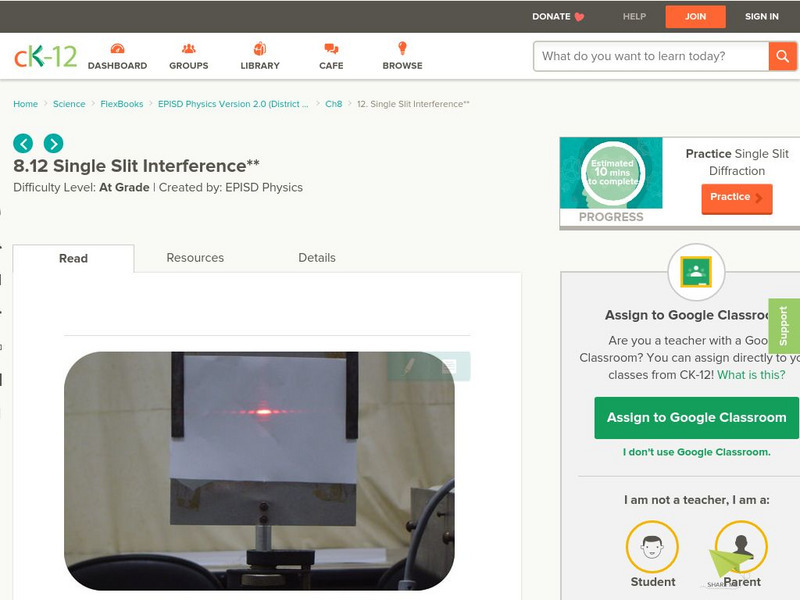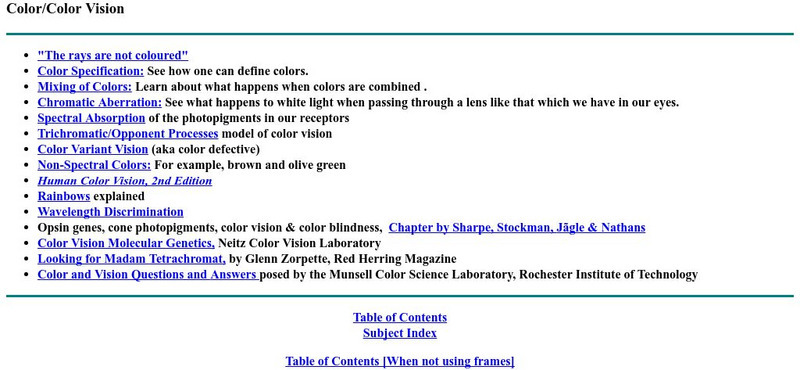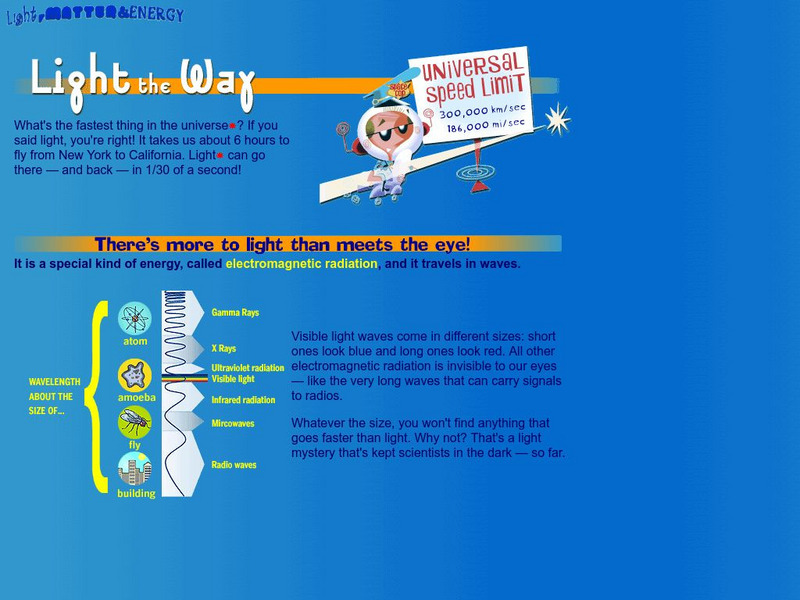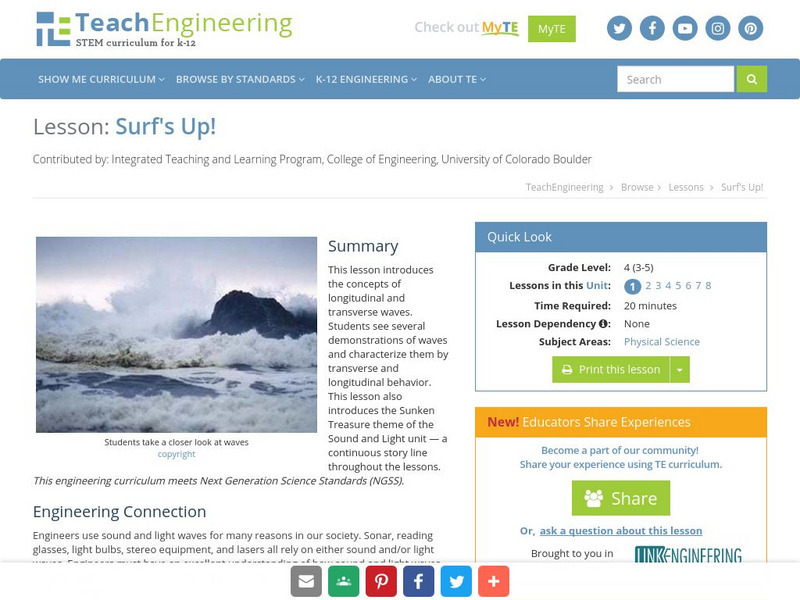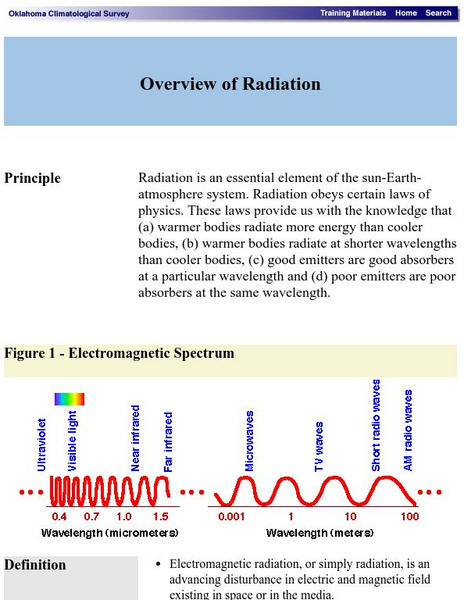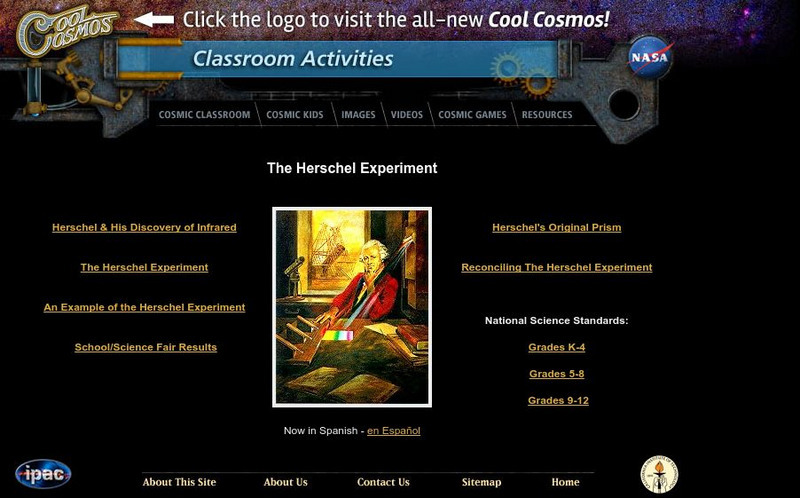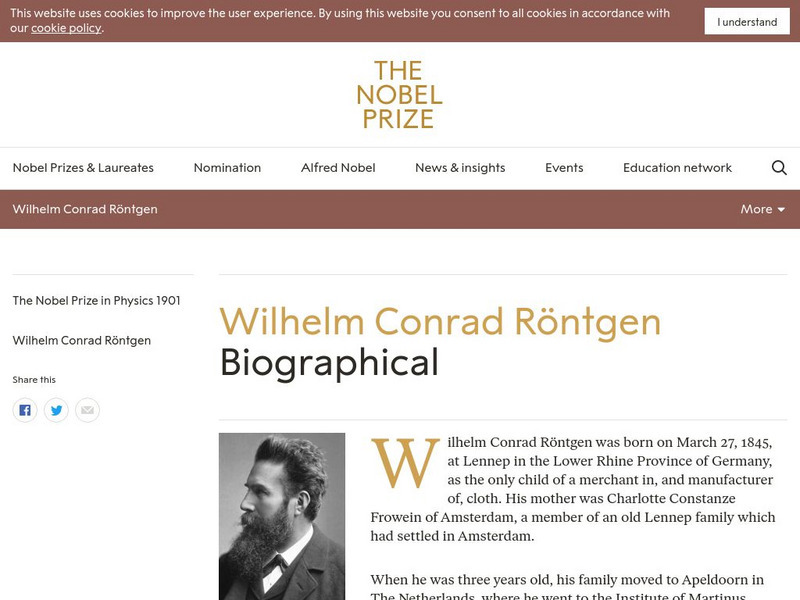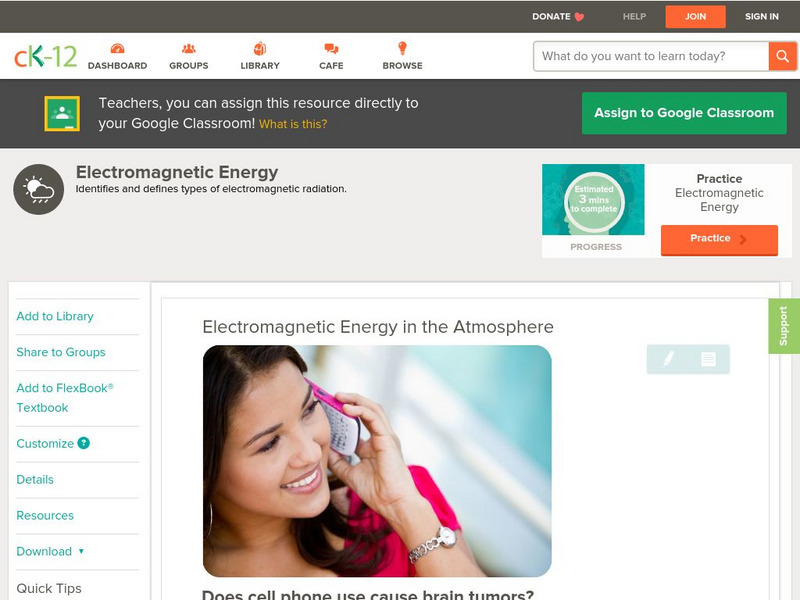Walter Fendt
Walter Fendt: Apps Zur Physik
This site, in German, offers numerous apps that illustrate common physics principles. Apps are organized into categories: mechanics, oscillations and waves, electrodynamics, optics, thermodynamics, the theory of relativity, physics of...
BBC
Bbc: Bitesize: Gcse: Physics: Reflection and Refraction
All waves will reflect and refract in the right circumstances. The reflection and refraction of light explain how people see images, color and even optical illusions. This tutorial discusses each concept and presents an experiment to try...
American Association of Physics Teachers
Com Padre Digital Library: Open Source Physics: Multiple Slit Diffraction Model
Simulation that shows the diffraction of light through single or multiple slits. Simulation allows modification of the number of slits, slit width, slit separation, and the wavelength.
CK-12 Foundation
Ck 12: Single Slit Interference
[Free Registration/Login may be required to access all resource tools.] Explains what causes single slit interference of light and how to find the wavelength of a single slit interference pattern using a formula.
York University
York University: Color and Color Vision
York University provides an index page to several other pages on the topic of color and color vision. The pages are part of an online "book." Many graphics and explanations.
American Museum of Natural History
American Museum of Natural History: O Logy: Light, Matter, Energy: Light the Way
What is electromagnetic radiation and how does it work? Review a captioned graphic that explains electromagnetic radiation and the visible and invisible types of radiation on the electromagnetic spectrum.
Fundación Cientec
Cientec: Instrumentos Para Investigar La Luz
This site shows how to build different instruments to experiment with light. Step by step instructions with pictures are provided.
Physics Classroom
The Physics Classroom: Polarization
"How Do We Know Light Behaves as a Wave?" An answer is provided in this discussion of the polarization of light and the use of Polaroid filters in sunglasses. The four methods discussed on this page are: polarization by transmission,...
University of New South Wales (Australia)
University of New South Wales: School of Physics: Physclips: Interference
Physiclips thoroughly presents interference of waves with animations and film clips.
CK-12 Foundation
Ck 12: Electromagnetic Spectrum
[Free Registration/Login may be required to access all resource tools.] Students learn what an electromagnetic wave is, gain a feel for the main parts of the spectrum, and work on problems involving basic properties of electromagnetic...
TeachEngineering
Teach Engineering: Surf's Up!
This instructional activity introduces the concepts of longitudinal and transverse waves. Students see several demonstrations of waves and characterize them by transverse and longitudinal behavior. This instructional activity also...
Oklahoma Mesonet
Oklahoma Climatological Survey: Overview of Radiation
This site details what radiation is, the physics of radiation, and radiative transfer as it occurs in nature. Content explores the electromagnetic spectrum, electromagnetic waves, properties of radiation, and solar radiation.
Georgia State University
Georgia State University: Hyper Physics: Color
This site from Georgia State University discusses the location of visible light on the electromagnetic spectrum. Includes the wavelength values for various colors of light within the visible light spectrum.
TeachEngineering
Teach Engineering: The Visual Spectrum
In this activity, students make simple spectroscopes (prisms) to look at different light sources. The spectroscopes allow students to see differing spectral distributions of different light sources.
California Institute of Technology
Cool Cosmos: The Herschel Experiment
This website provides a background on the discoverer of infared light--Sir Frederick William Herschel. A version of the experiment Herschel conducted in the 1800s is provided as well.
Space Telescope Science Institute
Amazing Space: Star Light Star Bright
Learn all about stars and the electromagnetic spectrum in this series of activities.
Physics Aviary
Physics Aviary: Radiant Emissions Lab
This lab is designed to allow students to look at the relative proportions of different wavelengths of light that are emitted by stars at different temperatures.
NASA
Nasa: Match Light Faces With Heat Faces
Can you picture someone in infrared? In this game, you try to match pictures taken of faces with a regular camera with those taken with an infrared camera. After the game, there is background information on infrared waves.
Wolfram Research
Wolfram Science World: Maxwell, James
This ScienceWorld site describes the Scottish mathematician and physicist James Maxwell (1831-1879) who published physical and mathematical theories of the electromagnetic field.
Nobel Media AB
The Nobel Prize: Wilhelm Conrad Rontgen Biographical
This biographical note on Wilhelm Conrad Rontgen describes his boyhood, upbringing, education, scientific work and accomplishments. Focuses on his studies of Xrays.
CK-12 Foundation
Ck 12: Earth Science: Electromagnetic Energy in the Atmosphere
[Free Registration/Login may be required to access all resource tools.] Overview of electromagnetic radiation.
E-learning for Kids
E Learning for Kids: Science: Winery: Why Can We See Through Some Objects but Not Others?
Learn about the properties of materials in their interactions with light, including whether they are opaque, transparent, or translucent, and which of these produce shadows.
Other
Atmospheric Optics
Instead of just ooohing and aaahing over that beautiful sunset, impress your loved ones with an insightful and informed explanation of just what makes sunsets so interesting, and they will oooh and aaah at you too! At this site, you'll...
TeachEngineering
Teach Engineering: Energy
Through nine lessons, students are introduced to a range of energy types--electrical, light, sound and thermal-as well as the renewable energy sources of wind, hydro (water) and solar power. Subjects range from understanding that the...
Other popular searches
- Light Waves
- Light and Sound Waves
- Properties of Light Waves
- Light Waves Activity
- Light & Sound Waves
- Light Waves Lab
- Light Spectrum Waves
- Interactions of Light Waves
- Light Waves Powerpoint
- Light Waves Astronomy
- Light Sound Waves
- Light and Radio Waves





